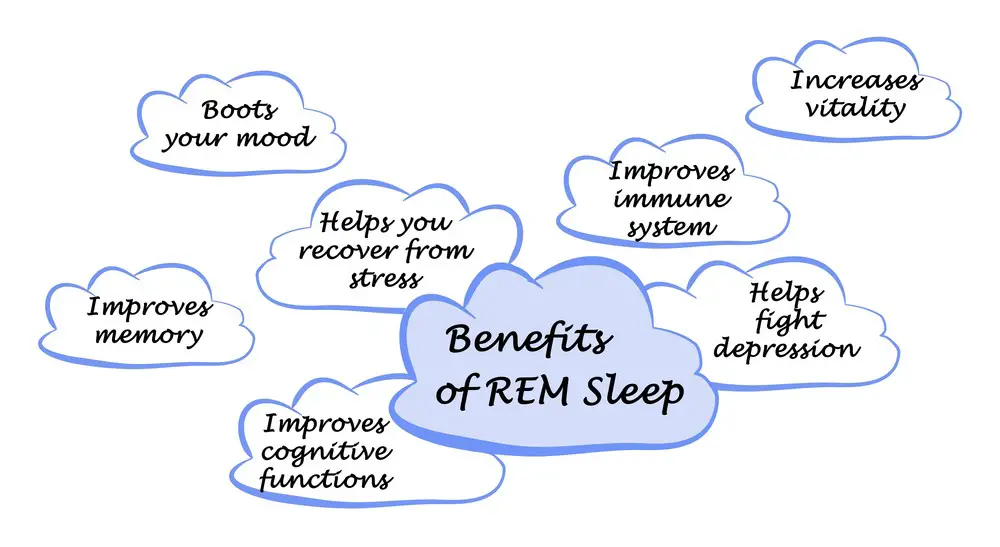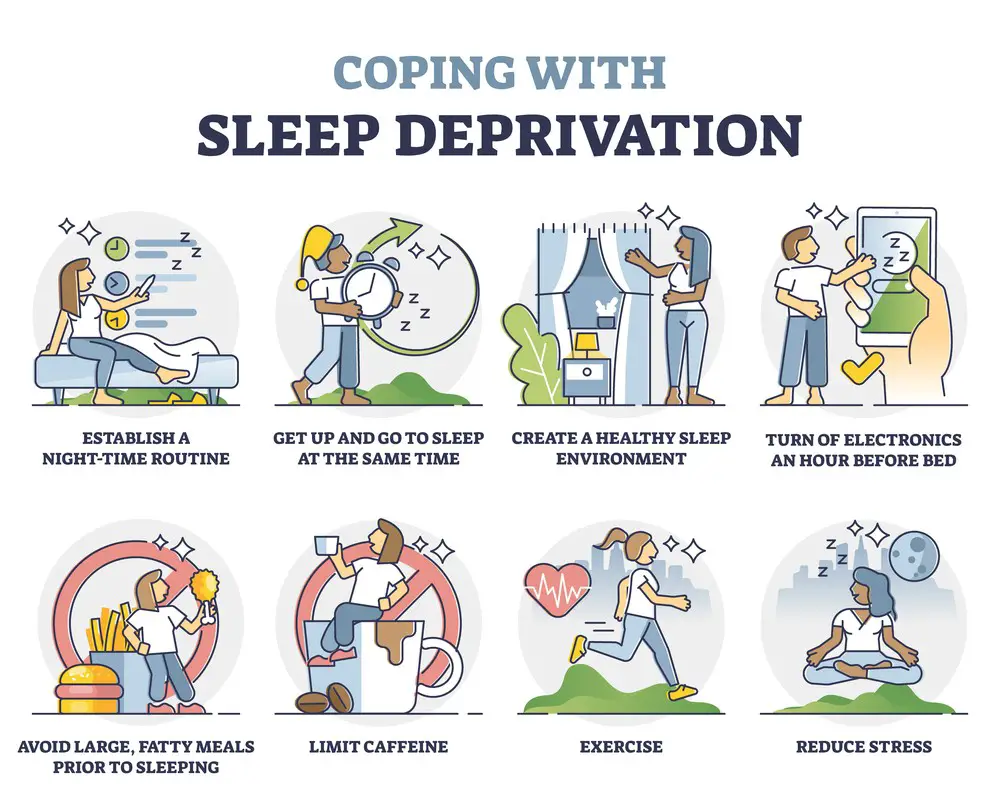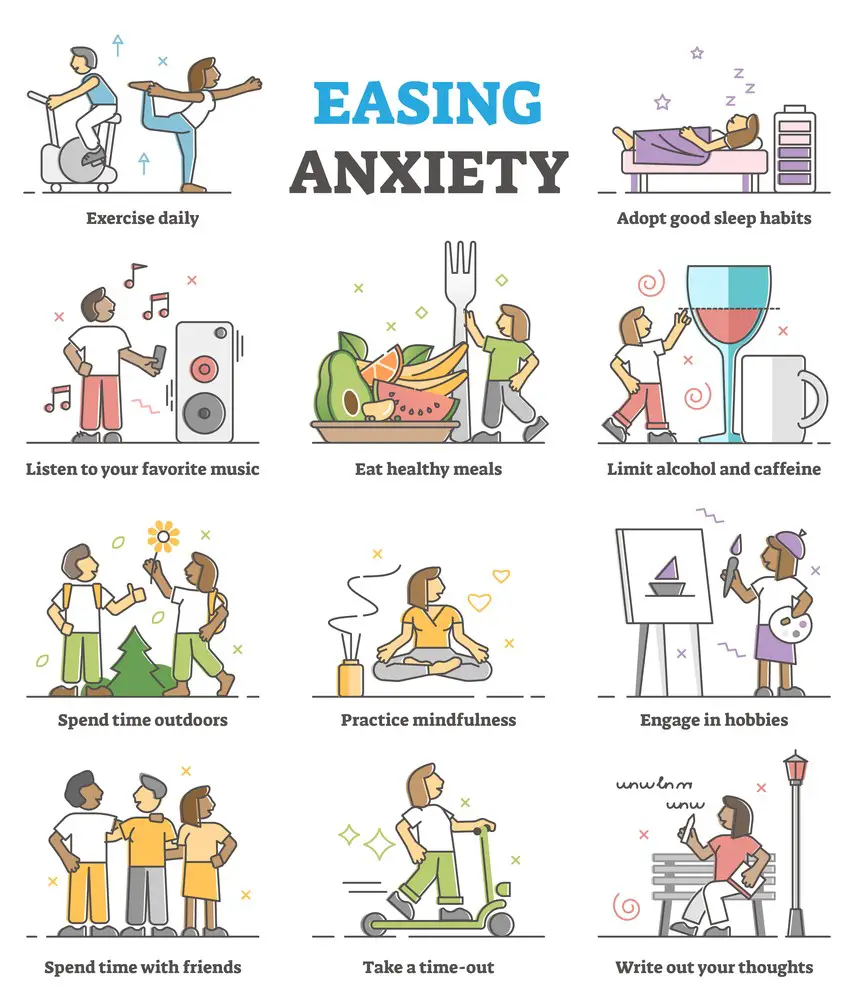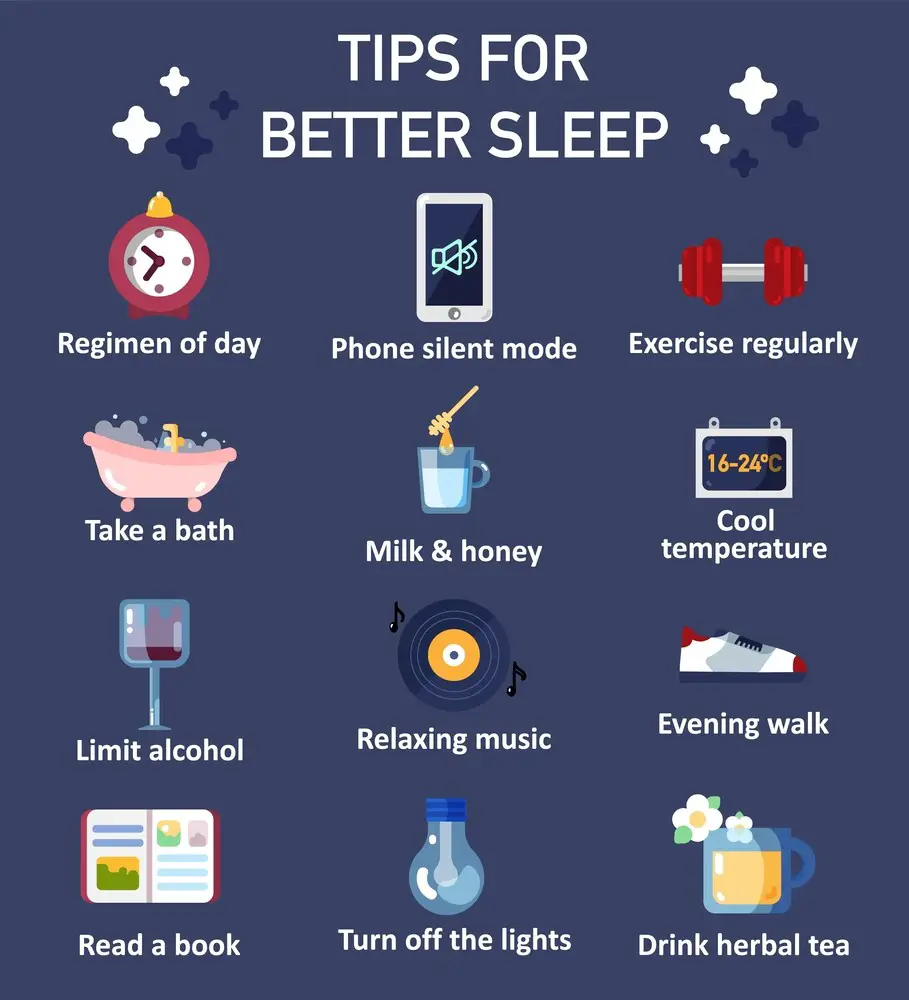Struggling to catch those deep, rejuvenating zzz’s? You’re certainly not alone in this quest for better sleep. Getting more REM sleep, which leaves you feeling truly refreshed in the morning, can seem daunting. But fear not because, with a few tweaks to your routine, you can enhance the quality of your slumber.
In this post, we’ll guide you through creating a consistent sleep schedule, setting up a sleep-friendly environment, and understanding the impact of diet and exercise on REM sleep. We’ll also share some stress-busting techniques to help quiet your mind at bedtime. Here are the key takeaways you can look forward to:
- Setting up a sleep schedule that works for you
- Crafting a bedroom oasis ideal for sleep
- Dietary tips for better REM sleep
- The role of physical activity in improving sleep quality
- Effective stress management for a peaceful night
By the end of this post, you’ll be equipped with actionable strategies to increase your REM sleep and wake up feeling refreshed and ready to take on the day. Let’s embark on this journey to better sleep together!
Understanding REM Sleep

What Is REM Sleep?
Definition And Characteristics
REM, or Rapid Eye Movement, sleep is a sleep cycle phase characterized by several distinctive features. During REM sleep, the brain is highly active, often even more active than when awake, and this is when vivid dreams occur. It’s named “Rapid Eye Movement” because, as the name suggests, the eyes move rapidly under closed eyelids. This stage is associated with a significant increase in heart rate, blood pressure, breathing, and muscle paralysis to prevent us from acting out our dreams.
Role In The Sleep Cycle
In the standard sleep cycle, REM sleep occurs cyclically throughout the night, progressively extending each REM period. It typically follows the stages of non-REM sleep, with the first REM stage occurring about 90 minutes after falling asleep and then repeating several times during the night. This cyclical pattern of sleep stages is essential for restorative sleep and overall well-being.
Importance Of REM Sleep
REM sleep has various importance. Here are some of them:
Cognitive Function And Memory
During the REM sleep stage, the brain processes and organizes information, allowing us to remember and understand what we’ve learned. It plays a pivotal role in forming long-term memories, problem-solving, and creative thinking. Lack of REM sleep can impair memory and cognitive performance.
Emotional Well-Being
During this stage, the brain processes and regulates emotions, helping us cope with daily stressors and maintain emotional balance. Adequate REM sleep can lead to improved mood, while a deficiency can contribute to mood disorders and emotional instability.
Also Read: Magnesium for Kids Sleep: A Natural Solution for Bedtime Bliss
 How to Get More REM Sleep
How to Get More REM Sleep
Here are some actionable tips for enhancing the quality and quantity of REM sleep
Healthy Sleep Habits
The following are essential when it comes to building healthy sleep habits.
Consistent Sleep Schedule
Maintain a consistent sleep schedule by going to bed and rising at the same times daily, including weekends. This practice aids in regulating your body’s internal clock, promoting increased REM sleep phases.
Creating a Sleep-Friendly Environment
Keep your bedroom dark, quiet, and at a comfortable temperature. Invest in a comfortable mattress and pillows, and remove any distractions, such as electronics, that may disrupt your sleep.
Lifestyle Factors
Diet and Nutrition
Steer clear of consuming hefty, spicy, or substantial meals near bedtime, as they may lead to discomfort and disrupt your sleep. Be mindful of your caffeine and alcohol consumption, particularly in the evening, as these substances have the potential to disrupt your sleep cycles.
Physical Activity and Exercise
Aim for moderate exercise during the day, but avoid intense workouts close to bedtime, as they can be stimulating and hinder your ability to fall asleep.
 Stress Management
Stress Management
Stress Reduction Techniques
Practice stress reduction techniques such as meditation, deep breathing exercises, or mindfulness to calm the mind and prepare it for restful sleep.
Relaxation Practices
Incorporate relaxation practices into your bedtime routine, such as progressive muscle relaxation or a warm bath. These activities can help ease tension and promote a peaceful transition into REM sleep.
Also Read: Tossing and Turning: Why You Can’t Sleep After Breakup and What to Do
Additional Strategies for Enhanced REM Sleep
Remember, the journey to better sleep is often about small, consistent changes that make a big difference over time
Enhancing Sleep Hygiene
- Exclusive Sleep Space: Reserve your bed for sleep only.
- Dim the Lights: Reduce light exposure before bedtime.
Nutritional Considerations
- Smart Snacking: Opt for light, healthy snacks if needed at night.
- Hydration Balance: Stay hydrated but limit fluids before sleep.
Managing Technology and Blue Light
- Screen Time Limitations: Reduce exposure to digital screens in the evening.
- Blue Light Countermeasures: Use filters or glasses to block blue light.
Mindful Consumption of Stimulants
- Caffeine Awareness: Avoid caffeine from mid-afternoon onwards.
- Alcohol Considerations: Be aware of how alcohol affects sleep quality.
Daytime Habits for Better Sleep
- Sunlight Exposure: Get natural light during the day.
- Nap Management: Keep naps short and not too late.
Establishing a Pre-Sleep Routine
- Relaxing Bedtime Rituals: Engage in calming activities before bed.
- Emotional Calmness: Avoid stressful conversations or activities before sleep.
Professional Consultation
- Seeking Expert Advice: Consult a specialist if sleep issues continue.
Each of these areas contributes to the overall quality of your sleep, particularly REM sleep. Feel free to experiment with these suggestions and observe what works best for you. Good sleep is often about finding the right balance in your daily habits and nighttime routines!
Sleep Aids and Supplements
Natural Remedies
Consider natural remedies like herbal teas (e.g., chamomile or valerian root) or aromatherapy (lavender essential oil) to promote relaxation and improve the quality of REM sleep.
Consultation with a Healthcare Professional
If you struggle to get enough REM sleep despite lifestyle changes, consult a healthcare professional. They can provide guidance and, if necessary, recommend sleep aids or supplements that are safe and effective for your specific needs.
Maximizing REM sleep involves a combination of healthy sleep habits, lifestyle adjustments, stress management, and, if required, appropriate sleep aids. By implementing these strategies, you can enhance the quality of your sleep and enjoy the cognitive and emotional benefits of ample REM rest.
Maximizing REM Sleep for Specific Groups
REM Sleep and Children

REM Sleep Patterns in Infants
In infants, REM sleep is abundant and vital for development. It accounts for a significant portion of their sleep, allowing their brains to process new information, grow, and develop. Infants may cycle through REM and non-REM sleep multiple times during a single sleep session.
Tips for Promoting REM Sleep in Kids
- Consistent sleep schedule: Establish a regular sleep routine to ensure children get enough sleep, including REM sleep. Children thrive on predictability; consistent bedtime and wake time can help.
- Create a soothing bedtime routine: Participate in soothing pre-sleep activities like reading a bedtime story or enjoying a gentle bath to help children prepare for a peaceful night’s rest.
- Limit screen time: Reduce exposure to screens (phones, tablets, TVs) before bedtime, as the blue light emitted can disrupt REM sleep patterns.
Understanding REM Sleep in Infants
- High Proportion of Sleep: Infants spend up to 50% of their sleep in the REM phase, compared to about 20% in adults.
- Brain Development: During REM, the infant’s brain is busy forming neural connections crucial for learning and development.
- Cycling Patterns: Infants have shorter sleep cycles than adults, meaning they enter REM sleep more frequently.
Also Read: Why Is My Newborn Fighting Sleep? Expert Tips to Tackle Bedtime Battles
Additional Tips for Promoting Healthy Sleep in Children
Establishing a Relaxing Environment
- Comfortable Sleep Space: Ensure the child’s bedroom is comfortable, quiet, and dark. Consider using blackout curtains and a white noise machine if needed.
- Temperature Control: Maintain a cool, comfortable temperature in the sleep area.
Nutritional Considerations
- Avoid Heavy Meals: Just like adults, children should avoid heavy or large meals close to bedtime.
- Balanced Diet: A well-balanced diet can positively impact sleep quality.
Incorporating Physical Activity
- Encourage Daytime Activity: Regular physical activity during the day can help children sleep better at night.
- Avoid Overstimulation: Be mindful of overstimulating activities close to bedtime.
Building a Sleep-Conducive Lifestyle
- Routine Relaxation Techniques: Gentle stretching or breathing exercises can be helpful for older children.
- Mindful Media Use: Be cautious about the content children consume before bedtime as it can affect their sleep.
Monitoring and Adjustments
- Observe Sleep Patterns: Consider how different routines affect your child’s sleep and adjust accordingly.
- Flexibility: Be prepared to adapt routines as children grow and their sleep needs change.
By fostering these habits and being attentive to your child’s unique needs, you can significantly enhance their sleep quality, including vital REM sleep. It’s all about creating a stable, calming environment and routine that signals to their young minds that it’s time for restful, rejuvenating sleep.
REM Sleep for Seniors
Changes in REM Sleep with Age
As people age, there is a natural decline in the amount of REM sleep they experience. Seniors may have shorter REM periods and spend more time in lighter sleep stages. This can result in reduced dream activity and less refreshing sleep.
Strategies for Seniors
- Prioritize sleep hygiene: Maintaining a comfortable and sleep-friendly environment becomes increasingly important for seniors. Ensure the bedroom is quiet, dark, and at a comfortable temperature.
- Regular exercise: Seniors should engage in regular physical activity, even low-impact exercise. This can help preserve the quality of their sleep, including REM sleep.
- Manage sleep disorders: Seniors are more prone to sleep disorders like sleep apnea and insomnia. It’s crucial to address and manage these issues with the help of healthcare professionals.
- Medication review: Review medications with a healthcare provider, as certain medications can affect sleep patterns. Adjusting medication schedules or types can help improve sleep quality.
Understanding Age-Related Changes in REM Sleep
- Decreased REM Duration: As people age, the length of REM sleep episodes can decrease.
- More Fragmented Sleep: Older adults often experience more fragmented sleep with frequent awakenings.
- Impact on Health and Well-being: Changes in sleep patterns can affect cognitive function and overall health.
Tailored Strategies for Seniors
Enhancing Sleep Environment
- Use of Sleep Aids: Consider tools like eye masks or earplugs if the environment is not completely quiet or dark.
- Appropriate Bedding: Invest in high-quality, comfortable bedding that supports good sleep posture.
Lifestyle and Diet Adjustments
- Healthy Diet: A diet rich in fruits, vegetables, and whole grains can promote better sleep.
- Limiting Caffeine and Alcohol: Reduce intake, especially in the evening, as they can disrupt sleep cycles.
Incorporating Mind-Body Techniques
- Relaxation and Meditation: Practices like yoga, tai chi, or meditation can help calm the mind and improve sleep.
- Mindful Breathing: Simple breathing exercises before bed can aid in relaxation.
Social and Mental Engagement
- Social Interaction: Engaging in social activities can improve mood and contribute to better sleep.
- Mental Stimulation: Activities like reading or puzzles can keep the mind active but should be balanced with relaxation.
Regular Health Check-ups
- Consulting Healthcare Providers: Regular check-ups can help in identifying and managing conditions affecting sleep.
- Sleep Apnea Awareness: Be aware of signs of sleep apnea, a common issue in seniors, and seek treatment if necessary.
Medication Management
- Regular Reviews: Reviewing medications with a doctor is essential to ensure they’re not affecting sleep negatively.
By adapting these strategies, seniors can tackle the challenges of age-related changes in sleep patterns. It’s about balancing an active lifestyle, a calming bedtime routine, and the right medical support when needed. This holistic approach can help maintain the quality of life and well-being in the golden years.
 Tips And Strategies
Tips And Strategies
The following are different strategies and tips for building good REM sleep.
Establishing A Relaxing Bedtime Routine
To establish a relaxing bedtime routine, you should;
Wind-Down Activities
To promote REM sleep, engage in calming activities in the hour leading up to bedtime. Read a book, practice gentle stretches, or meditate to signal to your body that it’s time to relax and prepare for sleep. These activities help transition your mind from the day’s hustle to a calm state.
Avoid Sleep Disruptors
Identify and avoid sleep disruptors in your routine. This may include limiting caffeine and alcohol intake, particularly in the evening, and refraining from heavy meals close to bedtime. Reducing exposure to screens, such as phones or computers, is also crucial due to the blue light emitted, which can interfere with your body’s production of melatonin, a sleep-inducing hormone.
The Role of Dreams in REM Sleep
Understanding Dreaming
Dreams play a significant role in REM sleep. During this stage, your brain becomes highly active, and the most vivid and memorable dreams occur. These dreams are thought to help with emotional processing, memory consolidation, and problem-solving. Understanding the significance of dreams can provide insight into the benefits of REM sleep.

Keeping a Dream Journal
Keeping a dream journal can help you become more aware of your dreams and how they relate to your REM sleep. Recording your dreams upon waking can assist in recognizing patterns, symbols, and recurring themes, providing a deeper understanding of your subconscious mind and sleep quality.
Also Read: Meditation for Sleep and Anxiety: Your Path to Peaceful Nights
Technology and REM Sleep
Blue Light and Sleep
Using electronic devices that emit blue light, like smartphones and computers, in the hours leading up to bedtime can disrupt your body’s natural sleep-wake rhythm. The blue light reduces the production of melatonin, making it more difficult to both fall asleep and achieve the necessary REM sleep. It’s recommended to minimize screen time before going to sleep to improve the overall quality of your sleep.
Using Sleep-Tracking Apps
While technology can disrupt sleep, it can also be harnessed to monitor and improve sleep patterns. Sleep-tracking apps can provide insights into your sleep cycles, including REM sleep. Understanding your sleep data allows you to adjust your routine to increase REM sleep and overall sleep quality.
Incorporating these tips and strategies, such as creating a relaxing bedtime routine, understanding the role of dreams in REM sleep, and managing the impact of technology, can help you maximize the benefits of REM sleep, enjoy more restful nights, and treat sleep disorders.
Conclusion
Maximizing REM sleep can significantly enhance your sleep quality and overall well-being. Establishing a relaxing bedtime routine, understanding the role of dreams in REM sleep, and managing the impact of technology are all essential strategies for achieving this goal. By prioritizing these practices, you can experience improved REM sleep’s cognitive and emotional benefits, such as enhanced memory consolidation, problem-solving skills, and emotional regulation. Embrace the power of REM sleep and unlock its potential to enrich your sleep and daily life. Sweet dreams and a more fulfilling sleep experience await!
Frequently Asked Questions About Getting More REM Sleep
What is REM sleep and why is it important?
REM (Rapid Eye Movement) sleep is a deep sleep phase characterized by rapid eye movements, increased brain activity, and vivid dreams. It’s crucial for memory consolidation, mood regulation, and overall brain health.
How much REM sleep do I need?
While it varies by individual, adults typically require about 20-25% of their sleep time in REM, which amounts to around 90-120 minutes for a standard 7-8 hour sleep period.
Can I increase the amount of REM sleep I get?
Yes, you can improve the quality and quantity of your REM sleep by maintaining a consistent sleep schedule, creating a sleep-friendly environment, managing stress, and adopting healthy lifestyle habits.
Does the food I eat affect my REM sleep?
Absolutely! Heavy, spicy, or large meals before bedtime can disrupt sleep. Opting for light, healthy snacks if needed is a better choice. Also, limiting caffeine and alcohol intake, especially in the evening, can help enhance REM sleep.
Is exercise beneficial for REM sleep?
Yes, regular physical activity, particularly during the day, can improve overall sleep quality, including REM sleep. However, avoid intense exercise close to bedtime as it might be overstimulating.
How does age affect REM sleep?
As we age, REM sleep tends to decrease. Older adults might experience shorter REM periods and spend more time in lighter stages of sleep.
Can napping affect my REM sleep?
Excessive napping, especially in the late afternoon or evening, can interfere with nighttime sleep patterns, including REM sleep. Short, early naps are less likely to disrupt your sleep cycle.
Are there any specific techniques to promote REM sleep?
Techniques like meditation, mindfulness, and relaxation exercises before bedtime can help transition smoothly into REM sleep. A calming bedtime routine is also beneficial.
Should I be concerned if I don’t remember my dreams?
Not necessarily. Dream recall varies from person to person and doesn’t directly indicate the quality of REM sleep. However, if you have concerns about your sleep quality, it’s wise to consult a healthcare professional.
Can certain medications affect REM sleep?
Some medications, including REM sleep, can impact sleep patterns. Discussing your medications with a healthcare provider if you’re experiencing sleep issues is essential.
- Left Arm Pain and Anxiety: Understanding the Relationship - November 23, 2023
- Anxiety Paralysis: Coping with Overwhelming Stress - November 23, 2023
- Anxious vs. Nervous: Differentiating Emotions and Responses - November 15, 2023
This site contains affiliate links to products. We will receive a commission for purchases made through these links.


 How to Get More REM Sleep
How to Get More REM Sleep Stress Management
Stress Management Tips And Strategies
Tips And Strategies

